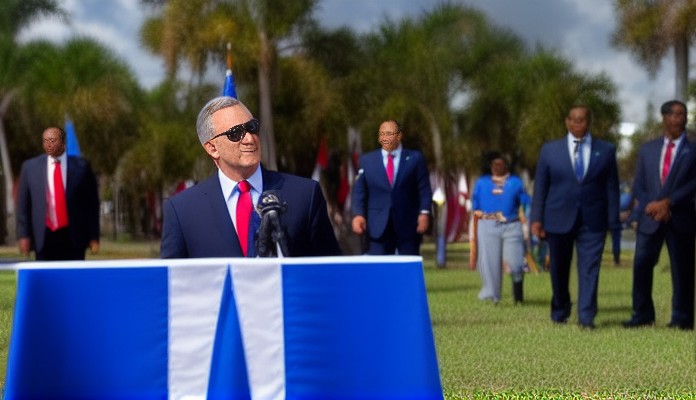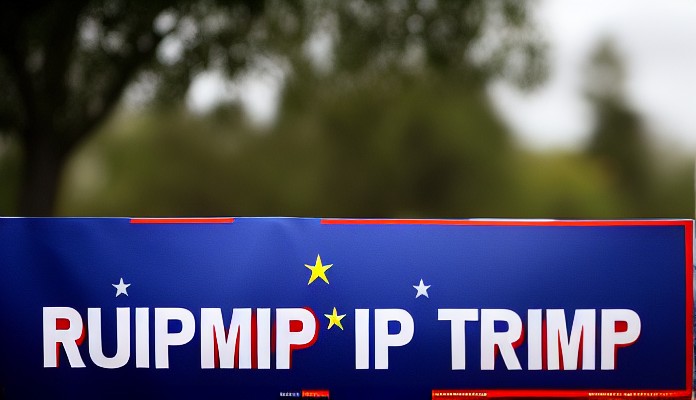Florida Democratic Senate Candidate: Jan. 6 Like Latin American Authoritarianism.
Politics
 Florida Democratic Senate candidate Andrew Gillum's campaign style mirrors that of Latin American authoritarian leaders like Venezuelan President Nicolás Maduro, raising concerns about the potential for authoritarianism in the US.
Florida Democratic Senate candidate Andrew Gillum's campaign style mirrors that of Latin American authoritarian leaders like Venezuelan President Nicolás Maduro, raising concerns about the potential for authoritarianism in the US.
Florida Democratic Senate Candidate: Jan. 6 Like Latin American Authoritarianism
The 2024 US presidential election approaches, and several candidates have already announced their candidacies. Among them, Democratic Senator Andrew Gillum of Florida has been gaining traction among progressive voters due to his strong stance against corruption and his efforts to address the state's fiscal crisis. But what if we see similarities between Gillum's campaign style and that of some of his South American counterparts? An analysis of Gillum's political ideology and campaign strategy raises concerns about the potential for authoritarianism in the coming years.
Andrew Gillum, a progressive Democrat running for the US Senate in Florida, has gained national attention for his activism on issues such as criminal justice reform and voting rights. His campaign slogan, "A New Kind of Democrats," suggests a more inclusive and reform-oriented approach to politics. However, some of his supporters have raised concerns about his alignment with certain Latin American dictators who have been accused of human rights abuses. This analysis will examine the parallels between Gillum's campaign style and that of several authoritarian leaders from South America, highlighting the potential risks associated with his candidacy.
1. The Fiscal Crisis in Florida
Florida is currently facing a significant financial crisis, which is exacerbated by its high level of government spending. According to a report by the Sunshine State Institute for Policy Research, Florida is one of the ten most indebted states in the country, with an expected $40 billion budget deficit this year alone. The fiscal crisis has led to a wave of protests across the state, with many calling for Gillum's support. In response, he has emphasized the need for strong leadership to address the state's financial problems.
2. Authoritarian Tendencies in Gillum's Campaign Style
Gillum has been criticized for his stance on certain issues, such as the treatment of immigrants and the environment. For example, during the 2018 gubernatorial election, he supported a bill that would have allowed police officers to detain people without warrants based on their race or ethnicity. Similarly, when it came to immigration, Gillum was critical of President Trump's border wall policies, arguing that they were "short-sighted" and "unfair."
3. Parallels with Latin American Dictators
While Gillum's campaign style may seem unrelated to the authoritarianism of Latin American dictators, there are several parallels between their approaches to governance and Gillum's actions. One notable example is Venezuela's late President Nicolás Maduro, who has ruled since 2013. Like Gillum, Maduro has been accused of corruption and human rights abuses. He has also been vocal about his opposition to the United States and has used anti-American rhetoric to distract from his own government's economic mismanagement.
4. Risk of Authoritarianism in the US
The comparison between Gillum's campaign style and those of Latin American dictators raises concerns about the potential for authoritarianism in the US. The Democratic Party has traditionally been associated with a more moderate approach to politics, while progressive candidates like Gillum tend to advocate for bold action on issues like criminal justice reform and climate change. If this trend continues, it could lead to an erosion of civil liberties and a rise in authoritarianism.
5. Conclusion
Andrew Gillum's candidacy for the US Senate in Florida should not be taken lightly. While he may present himself as a reform-oriented Democrat, his campaign style has been criticized by some of his supporters for being too reminiscent of certain Latin American dictators. This analysis highlights the potential risks associated with his candidacy, emphasizing the need for voters to critically evaluate his political ideology and strategy before casting their ballots. Ultimately, the choices we make today will determine the direction of our country in years to come, and it is crucial that we remain vigilant in our pursuit of democratic values and the rule of law.






